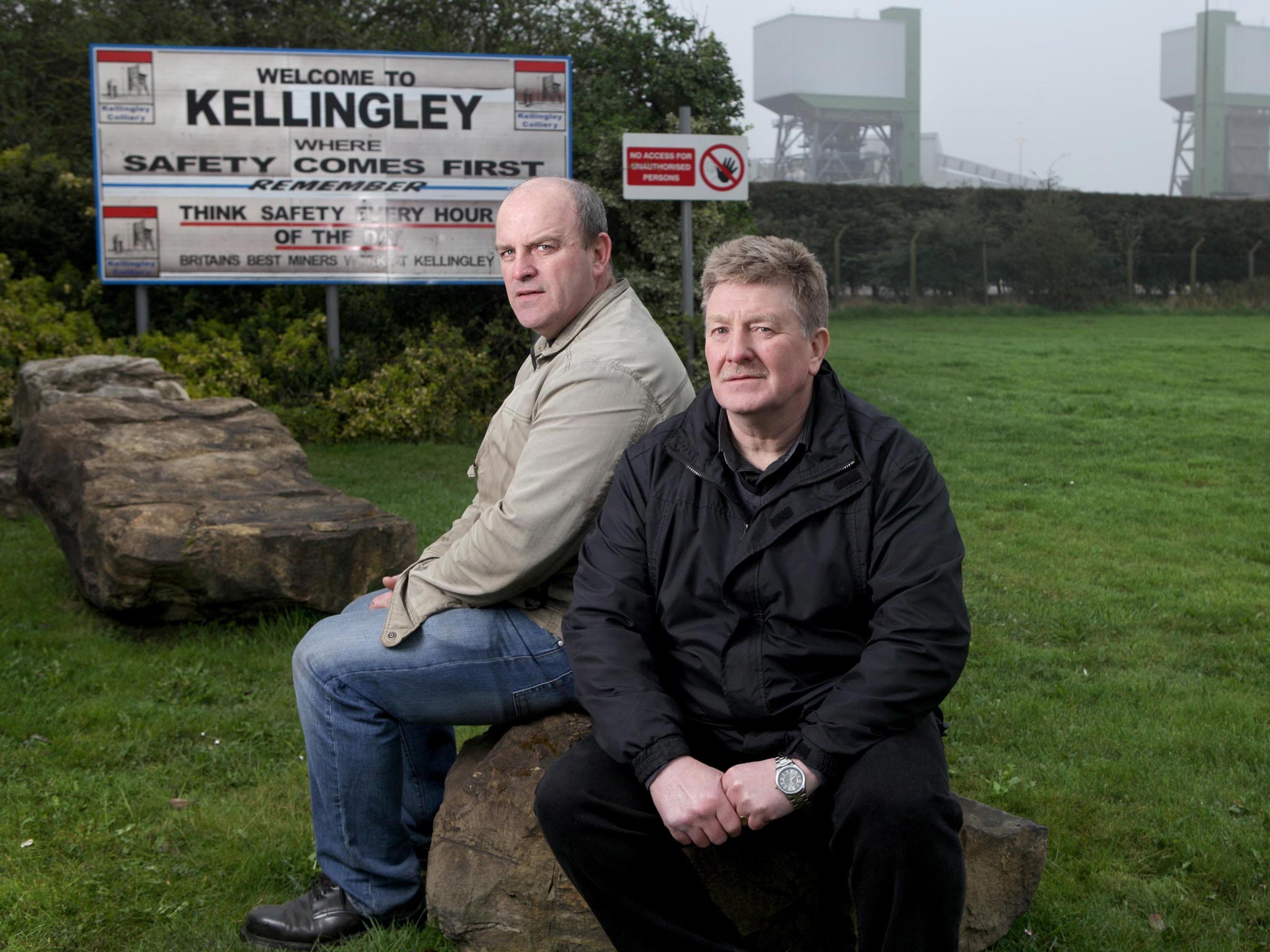Kellingley Colliery miners confused by ‘economics of the madhouse’
As plans are made to shut Kellingley, one of the last deep pits in the UK, Jonathan Brown meets its workers

Your support helps us to tell the story
From reproductive rights to climate change to Big Tech, The Independent is on the ground when the story is developing. Whether it's investigating the financials of Elon Musk's pro-Trump PAC or producing our latest documentary, 'The A Word', which shines a light on the American women fighting for reproductive rights, we know how important it is to parse out the facts from the messaging.
At such a critical moment in US history, we need reporters on the ground. Your donation allows us to keep sending journalists to speak to both sides of the story.
The Independent is trusted by Americans across the entire political spectrum. And unlike many other quality news outlets, we choose not to lock Americans out of our reporting and analysis with paywalls. We believe quality journalism should be available to everyone, paid for by those who can afford it.
Your support makes all the difference.On a clear day you do not have to climb to the top of the giant winding towers of the mine known as “Big K” to see the billowing chimneys of Drax – Europe’s largest coal-fired power station.
Nearly all the 2.3 million tons of coal ready to be dug out of Kellingley Colliery each year is destined to be taken only a few miles away, across to the opposite bank of the lower Aire valley to be burnt there to generate electricity.
But this week it emerged that UK Coal was planning to shut Kellingley in North Yorkshire and Thoresby in Nottinghamshire two of the last three deep pits in the country with the loss of 1,300 jobs.
Should a last-minute rescue attempt fail, Drax’s coal will come from Russia or the United States. “It’s the economics of the madhouse,” says Keith Poulson, who has worked in the pit since 1988.
Like many of the 700 employees, the 54-year-old secretary of the local National Union of Miners branch is an émigré from other mines across Yorkshire, the Midlands and the North-east. These skilled men wound up at the so-called super pit hoping they had a future following the mass closures during the 1980s and 90s.
“Talking to the lads, they have been through this process a dozen times,” explained Mr Poulson. “We have people working here who live in Northumberland or Stoke-on-Trent. This is not a pit with a village, but while the worst impact will be here, the effects of its closure will ripple out and be felt across the country.”
Electrician and fellow union official Keith Hartshorne, 57, agreed. “It will cost the same to close it and fill in the shaft as it will to keep it open. The future, that’s what we are fighting for now. Without it there is no future,” he said.
As recently as January, owners UK Coal hired nine young apprentices at the site. “When they were taken on the company said there was 50 years of coal left in Kellingley. My heart goes out to those lads it really does, they were living the dream. They are the sons of miners who worked here,” Mr Poulson added.
In 1970, there were 287,000 miners in Britain employed at 300 collieries. Britain’s only remaining deep shaft colliery, Hatfield – featured in the film Brassed Off – will for now continue to employ 700 people in Ed Miliband’s neighbouring constituency of Doncaster North. It was only saved when it was sold to an employee benefit trust last year.
Negotiations have been underway this week to secure some kind of future for Kellingley and Thoresby. The Prime Minister, David Cameron, has said the Government “will do everything it can”, although ministers indicated they are unable to provide direct aid under European Union rules – a claim disputed by unions and Labour.
A bail-out costing between £10m and £20m could help save 700 jobs at UK Coal’s six remaining surface pits and extend the working lives of the remaining two mines by up to 18 months. The company’s problems stem from the underground fire last year at Daw Mill in Warwickshire, that forced it to shut. But it is not the only issue facing the industry, explained Mark Spencer, Conservative MP for Sherwood in Nottinghamshire, which is home to Thoresby.
“Fracking in the United States has lowered the wholesale price of gas so that America is now dumping its coal on the world market. Because coal is traded in dollars, the strength of the pound makes it even cheaper,” he said.
In the US coal is scooped out of the ground in bulldozers, making it vastly cheaper than UK deep mines which can stretch for up to 10km (six miles) underground.
None of this bodes well for the future of British miners, despite rising hopes over the future of carbon capture technology which is being trialled at the White Rose project on land adjacent to Drax. If applicable on an industrial scale, it could yet transform the market for domestic coal.
“We need to have one eye on global energy security. I don’t want to be standing here in 20 years’ time complaining about too many Polish workers coming in because we have lost the skills to lift it,” Mr Spencer said.
Meanwhile, back in Knottingley, the neighbouring town to the Big K, concern among local business owners at the impact of the closure was rising.
Every week the colliery sends out for fish and chips from Tony Swain’s The Dishy Fish – a chippy on the Hill Top parade where a number of the shops are already shuttered. “We thought it would stay open for ever. The last thing we want now is for it to close,” said Mr Swain.
Join our commenting forum
Join thought-provoking conversations, follow other Independent readers and see their replies
Comments